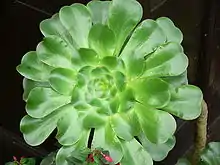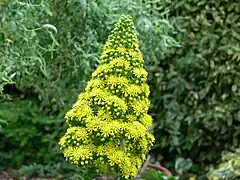| Aeonium undulatum | |
|---|---|
 | |
| Foliage | |
| Scientific classification | |
| Kingdom: | Plantae |
| Clade: | Tracheophytes |
| Clade: | Angiosperms |
| Clade: | Eudicots |
| Order: | Saxifragales |
| Family: | Crassulaceae |
| Genus: | Aeonium |
| Species: | A. undulatum |
| Binomial name | |
| Aeonium undulatum | |
| Synonyms[1] | |
| |
Aeonium undulatum is a succulent, evergreen flowering plant in the family Crassulaceae. It is a subshrub, one of the larger species of Aeonium with an 8–12 inches (200–300 mm) rosette of bright, glossy green leaves[2] often over a metre from the ground on a single, unbranched stem.[3] Other rosettes do not branch off this stem (normally) but grow from the bottom, unlike most aeoniums. The plant is monocarpic so the flowering stem will die when after producing its yellow inflorescence, which is normally after about 5 years.[4]
Aeonium undulatum is native and endemic to Gran Canaria in the Canary islands.[5]: 167
The Latin specific epithet undulatum means "wavy", and refers to the leaf shape.[6][7] The common name "saucer plant" is applied to this and other plants of a similar habit.[8]
In temperate regions this plant may be grown under glass, in a suitable cactus compost.[9] It prefers full sun to part shade and requires excellent drainage.[3] In the US, it may be grown outside in zones 10 and 11.[10]
 Inflorescence
Inflorescence
References
- ↑ The Plant List, Aeonium undulatum Webb & Berthel
- ↑ susan.mahr. "Aeonium". Wisconsin Horticulture. Retrieved 2021-04-12.
- 1 2 "Aeonium undulatum". www.tropicalbritain.co.uk. Retrieved 2021-04-12.
- ↑ "Aeonium undulatum (Stalked Aeonium)". Succulents.today. Retrieved 2021-04-12.
- ↑ Bramwell, D.; Bramwell, Z. (2001). Wild flowers of the Canary Islands. Madrid, Spain: Editorial Rueda. ISBN 84-7207-129-4.
- ↑ Harrison, Lorraine (2012). RHS Latin for Gardeners. United Kingdom: Mitchell Beazley. ISBN 184533731X.
- ↑ (in Spanish) Flora Vascular de Canarias
- ↑ "Desert Tropicals". Archived from the original on 2009-05-31. Retrieved 2009-04-29.
- ↑ "RHS Plant Selector - Aeonium undulatum". Retrieved 5 March 2021.
- ↑ "Aeonium undulatum - Plant Finder". www.missouribotanicalgarden.org. Retrieved 2021-04-12.